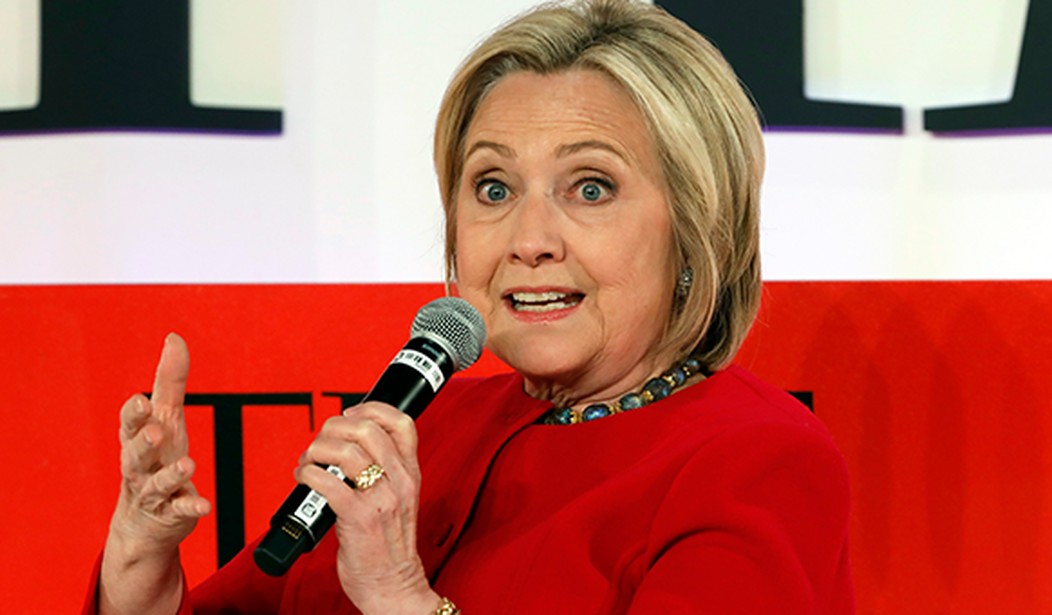As we mentioned in our lengthy analysis post yesterday, Washington has long been awash in hypocrisy on the issue of judicial confirmations. This is especially true today, as the two parties have effectively switched positions on what to do about an election year Supreme Court vacancy (though as we also pointed out, Mitch McConnell was careful and consistent in staking out his stance). The media will undoubtedly highlight clips of Republicans rejecting the notion of considering President Obama's 2016 nominee to replace the late Justice Scalia, arguing that voters should have a say in the matter, given the opening's proximity to a national election. Democrats demanded at the time that the Senate 'do its job,' insisting that 'we need nine' on the bench, referring to a full complement of justices.
Especially relevant to the conversation was Joe Biden's 1992 admonition that the then-Democrat-controlled Senate Judiciary Committee would "seriously consider" not taking up the nomination of a potential SCOTUS nominee made by President George H.W. Bush in that election year. This, Republicans said four years ago, was the 'Biden Standard.' Biden rejected that characterization as Obama's Vice President, in an effort to save the Garland nomination, strongly asserting that as Judiciary Chairman, he would have moved the confirmation process forward even in the waning months of a presidential election year. Even if the president were from the opposing party. If that's the truth, then he must support President Trump's authority to nominate, and for the GOP Senate to confirm, Justice Ginsburg's replacement -- yes? He bent over backward to reject his previous comments and clarify how that was and is his principled position.
This would be even more of a slam dunk, historically speaking, in light of unified partisan control of the presidency and Senate. In this detailed piece, the record is laid out, demonstrating that the overwhelming majority (80 percent) of presidential-year SCOTUS nominations made under such partisan circumstances have resulted in confirmations (including several in lame duck sessions). Meanwhile, here was Hillary Clinton's official statement on the 2016 Scalia vacancy:
Recommended
Statement on the passing of Supreme Court Justice Antonin Scalia: pic.twitter.com/xazj9dDd5c
— Hillary Clinton (@HillaryClinton) February 14, 2016
Any effort to prevent a justice from being seated -- a "constitutional obligation" -- would "dishonor our constitution," she wrote. Because nearly every single politician involved in these battles are partisan hacks guided by power, there's no way Hillary still believes any of that. She didn't really believe it then. She said what she needed to, based on what would increase the likelihood of her ideological tribe gaining power. It's that simple. And that's also true of nearly all of the Republicans. Here's a Biden campaign aide launching an ignorant attack on Senate Majority Leader Mitch McConnell:
Mitch McConnell is trying to pass a Supreme Court nomination before passing a Coronavirus bill.
— Chris Strider (@stridinstrider) September 19, 2020
Tells you everything you need to know.
This racked up tens of thousands of retweets and more than 120,000 likes. My reply: "Ooh, try again. Democrats filibustered the new Coronavirus bill (trillions had already been spent in previously-passed legislation). Thanks to Harry Reid, that option is unavailable on a judicial nomination. Seems like some people need to know more than they think they do." It's pretty brazen to blame McConnell for not passing another round of Coronavirus relief legislation when it was Joe Biden's party that uniformly blocked a bill from advancing. And the Harry Reid point has been haunting Democrats since the moment Donald Trump won the election four years ago. Also, I touched on this in my piece earlier, but beyond the clear constitutional authority Republicans have to move ahead with the confirmation process, there's also a democracy point to be made here:
Relevant: In the most recent national election (2018), judges/SCOTUS was a *huge* issue litigated in contested Senate races & voters decided to *expand* the existing GOP senate majority.
— Guy Benson (@guypbenson) September 19, 2020
Elections have consequences. As many on the Left issue wild-eyed threats about burning down institutions and shattering norms if President Trump replaces Justice Ginsburg this year, please read this good piece from Trump-hostile conservative Matt Lewis. He calmly notes that when Trump nominates a candidate, he will be engaging in legitimate action that actually upholds norms:
NEW—> Trump Replacing Ginsburg Isn’t a Crime Against Democracy. It’s How Democracy Works. https://t.co/CCRL9PsOcB via @thedailybeast
— Matt Lewis (@mattklewis) September 19, 2020
Oh, and here's one more little flashback, given some people's interest in this person's stated wishes:
"There's nothing in the Constitution that says the president stops being the president in his last year," Ginsburg said in a 2016 New York Times interview in which she called for Garland to receive a confirmation vote in the Senate. As for whether the Senate should take up a vote on Garland, Ginsburg said at the time, "That's their job."
Noted. I'll leave you with Mitch McConnell making an extremely strong case for swift confirmation:

























Join the conversation as a VIP Member